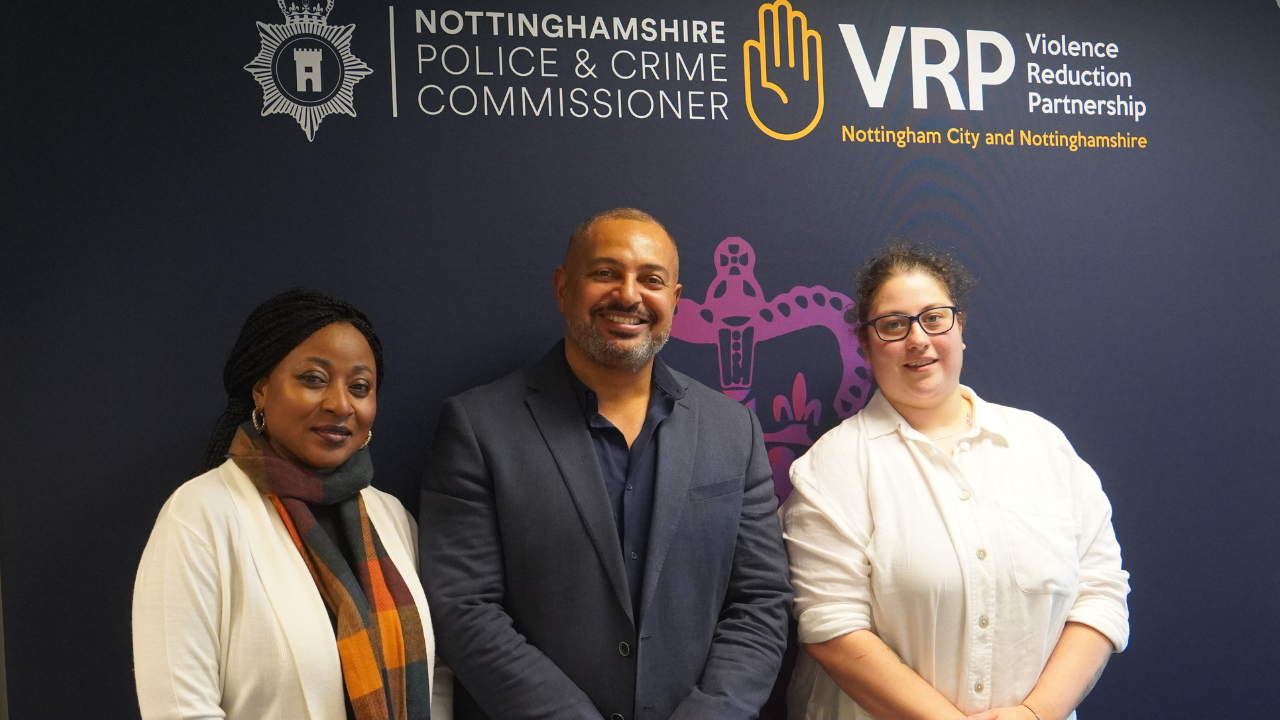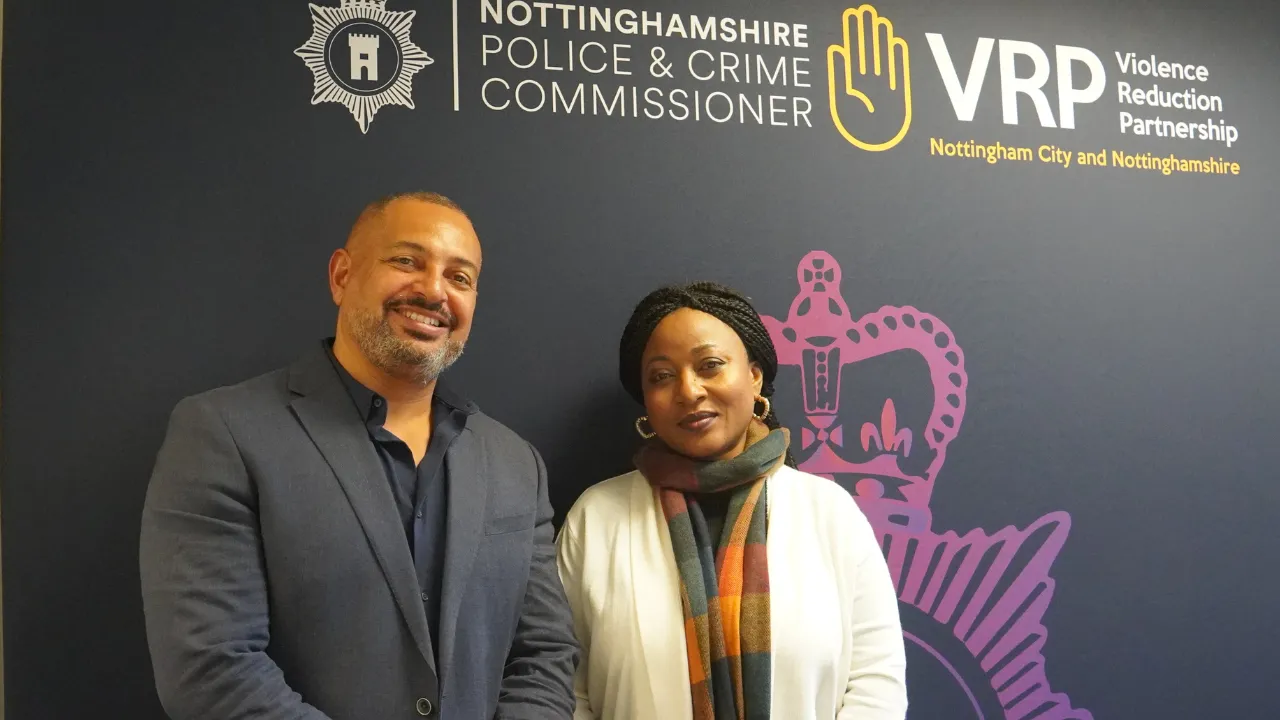Support made hate crime victim feel safer
A victim of hate crime said she felt safer because police and support services ‘had her back’ when she reported vile racist abuse.
Adey Adetoro, of Retford, was with her niece visiting Worksop when they were both subjected to racially abusive comments and swearing from a drunk man in the street.
The 51-year-old said she was shocked and her niece was particularly traumatised by the ordeal.
“Nobody should be doing that in the 21st century,” said Adey, whose story is being shared during national Hate Crime Awareness Week.
“I’ve been in this country since 2008 and I don’t think I’ve experienced this type of hatred from anyone.”
Adey said the man also started taking their photos, so she took out her phone and started videoing the exchange – and this video footage was later used as evidence when she reported it to Nottinghamshire Police.
The mother-of-one was visited at her home by a police officer who took her statement and reassured her that there was a good chance the perpetrator would be caught as there was lots of CCTV in the town centre, as well as Adey’s recording.
A photo of the suspect was then published on Nottinghamshire Police’s social media channels and within hours, they had received calls from a number of people giving a name.
Adey, who works as a support worker for people with autism and disabilities, said she and her niece had just left church on Palm Sunday earlier this year when they received a call from the investigating officer to say the man had been called in for questioning, and they were asked how they wanted to proceed.
They talked through the potential options, and while they wanted to forgive in the spirit of their faith, they also wanted justice and for lessons to be learned.
It was then they were introduced to the concept of restorative justice – where the victims and perpetrators are given the chance to communicate with each other, so the victim can explain the impact the crime had on them and so the perpetrator can apologise for their actions.
This service, known as Restorative Nottinghamshire, is delivered by Remedi and commissioned by the Office of the Police and Crime Commissioner, as one of a number of services which it funds to support victims and improve public safety.
“I said I want to meet him,” said Adey. “I need to educate him and say ‘listen, get out of your shell.’
“I’m originally from Nigeria and when people come to our country we really appreciate it. We treat them like kings and queens. We want to make you have a good experience. That’s what we also expect from here.”
Adey said that when Restorative Nottinghamshire facilitated the meeting with the perpetrator, he was extremely remorseful, embarrassed and apologetic.
Adey and her niece were happy with the restorative justice experience because they got to look the offender in the eye and see that he had learnt his lesson.
“It’s been a win-win for everybody,” she said.
“It was really emotional at some points because he was almost crying.
“He said he’d never been like that before and he didn’t know what came over him.”
Adey said the timing of the meeting came as disorder had erupted around the country led by the far-right, which had left her feeling scared for the first time in England.
However, the restorative justice meeting made her and her niece feel really safe and reassured.
“My niece said she feels safer with Restorative Nottinghamshire’s involvement, the police’s involvement, and she feels relieved,” she said.
“I really felt much better meeting him again one-on-one. It felt he was sincere, and I felt it was honest.
“It was much better for me, meeting him. If I never met him, I would probably still be angry. It’s actually a therapy, that you have people there that are actually supporting you.
“If I know I can always call the police and then they back me up and they recommend people to me and really protect me, of course you have that confidence built back in. Even though I’m not in my home country, there’s still people that have got my back.”

Aisha Edwards, a practitioner from Restorative Nottinghamshire, said restorative justice was extremely powerful in helping people to recover from the impact of crime.
“Restorative justice gives a voice to people and helps them feel empowered. It gives them the opportunity to explain the impact and ask questions,” she said.
“Some of these questions that people have can only be answered by one person (the perpetrator). It is a very impactful process. It gives them their own power back and helps them move forward. It helps them heal.”
Restorative Nottinghamshire is just one of a number of support services for victims of crime funded by the Office of the Police and Crime Commissioner for Nottinghamshire.
Nottinghamshire Police and Crime Commissioner Gary Godden said: “It is always shocking to hear about incidents such as Adey’s experience of being a victim of hate crime.
“I want to be really clear that there is no place for hate in Nottinghamshire, which I consider to be a welcoming and tolerant county.
“I would encourage anyone affected by hate crime to report it. We know many people don’t – but I think Adey’s story shows that if you do come forward you can be confident that you will be looked after and given the support you need.”
Chief Inspector Craig Berry, Nottinghamshire Police’s hate crime lead, said: “I’d like to thank Adey for coming forward and sharing her experience of meeting back up with the person who abused her.
“What happened to both her and her niece that day was abhorrent and unacceptable, while it completely went against how we expect people in our county to behave.
“Restorative justice is just one of the options available following an offence of this nature.
“It gives people the chance to communicate with each other to help victims get some form of closure and hopefully help offenders change their ways for the better too.
“It’s pleasing to hear Adey had such a positive experience of utilising this service, with the meeting giving her the opportunity to get across how her abuser made her feel, while also receiving a face-to-face apology.”
- To report hate crime, call Nottinghamshire Police on 101 or visit the force’s website to report online. If it is an emergency, dial 999.
- For more information on Restorative Nottinghamshire visit Home - Restorative Nottinghamshire (restorativenotts.org.uk)
- People affected by hate crime can also receive free practical and emotional support through Nottinghamshire Victim CARE, which is another support service commissioned by the Office of the Police and Crime Commissioner for Nottinghamshire. This service is available to victims of crime, regardless of whether they have reported it to the police. Find out more here Home - Remedi Victimcare (nottsvictimcare.org.uk)

